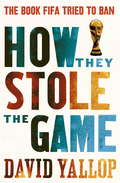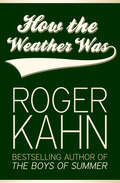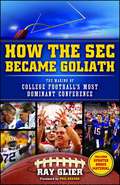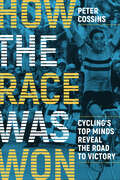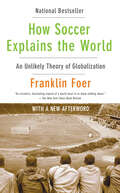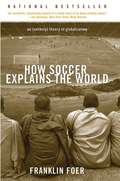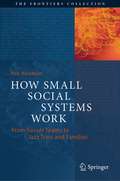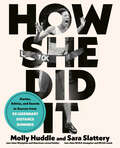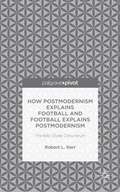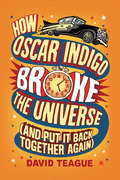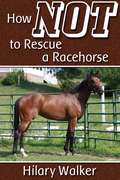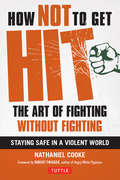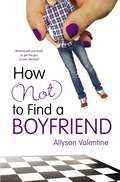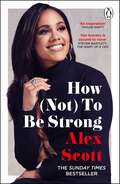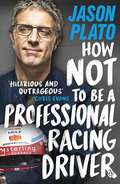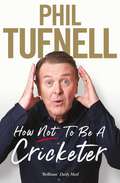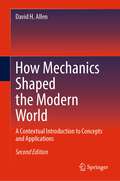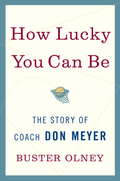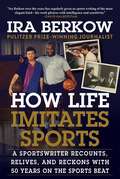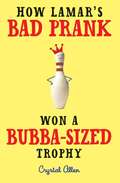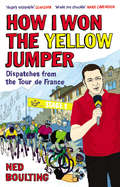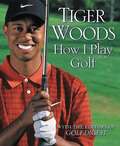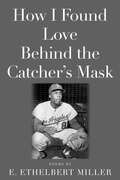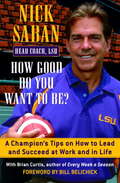- Table View
- List View
How They Stole the Game
by David YallopWhat's wrong with Football today? In June 2011, Sepp Blatter was elected - uncontested - as president of Fifa once more. Despite attempts to halt the vote amidst allegations and accusations of corruption, the show went on. As How They Stole The Game, David Yallop's classic expose of the dark heart behind the beautiful game showed when it was first published, Football was rotten from the top down. In the book Yallop reveals the story of João Havelenge, Fifa President from 1974 to 1998, the Godfather of football, and how he turned a religion to millions of fans into a multi-billion dollar business, riven with suspicious deals and unexpected payments.
How the Weather Was
by Roger Kahn&“Beautiful…persons and events through the eyes of a sharp, articulate observer.&” —NEW YORK TIMES&“No one else has written a piece so startling about the legend of Babe Ruth…After reading this book you will never feel the same about a lot of legends…A very special book…A book to treasure.&” —CHICAGO SUN-TIMESRobert Frost, Claudio Arrau, John Lardner, Jackie Robinson, Babe Ruth, Willie Mays, Leo Durocher, Bobby Thomson, Al Rosen, Jascha Heifetz, and other heroic figures in their years of glory, in their times of trial. This is a book about people to be remembered, and what it was like in America at a very special time.Praise for Roger Kahn:"As a kid, I loved sports first and writing second, and loved everything Roger Kahn wrote. As an adult, I love writing first and sports second, and love Roger Kahn even more." —Pulitzer Prize winner, David Maraniss "He can epitomize a player with a single swing of the pen." —TIME magazine "Roger Kahn is the best baseball writer in the business." —Stephen Jay Gould, New York Review of Books"Kahn has the almost unfair gift of easy, graceful writing." —BOSTON HERALD
How the SEC Became Goliath
by Ray GlierHow the SEC Became Goliath covers the Southeastern Conference and how the league became dominant in college football, winning six straight national championships. Size matters. That's why the SEC is Goliath, because the Southeastern Conference, top to bottom, has better coaches, better stadiums, better bank accounts, and better weather, but the real difference maker is the bigger and better players. For six straight years the SEC has walked off with the big crystal prize and will not give it back. The talk of "big boy football" grinds on the Buckeyes, Sooners, Longhorns, and Ducks. All they can come back with is "Wait until next year." Then next year comes and the SEC tribe is chanting in the closing minutes of the National Championship Game, "SEC, SEC, SEC!" The national championship trophy has been in the South for so long it has sunburn. That is why college football is thick with the acrimony: SEC vs. Everyone Else. The dominance of the SEC has a lot more to do with the South's culture than just the rock-'em, sock-'em of football played one day a week. The South lost the Civil War, and sociologists will tell you that there is still a regional angst, an "us against them" mentality, a spirit of "those damn Yankees." It is not just about championships. The SEC is about culture and competitiveness. . . . It is about players. *** How the SEC Became Goliath provides an inside look at college football's most dominant conference. Four different schools in the SEC have won the last six championship titles: Florida vs. Ohio State in 2006 January 8, 2007 * The Zook-Meyer Gators embarrass the Big Ten. Florida 41 Ohio State 14 LSU vs. Ohio State in 2007 January 7, 2008 * Unbeaten in regulation, the Tigers are good . . . and lucky. LSU 38 Ohio State 24 Florida vs. Oklahoma in 2008 January 8, 2009 * One of the best teams in history, these Gators are all Meyer's. Florida 24 Oklahoma 14 Alabama vs. Texas in 2009January 7, 2010 * The Tide make it four in a row for the SEC.Alabama 37 Texas 21 Auburn vs. Oregon in 2010 January 10, 2011 * Cam Newton and Auburn cap a perfect season. Auburn 22 Oregon 19 Alabama vs. LSU in 2011 January 9, 2012 * Saban wins his third title and the SEC makes it six in a row. Alabama 21 LSU 0
How the Race Was Won: Cycling's Top Minds Reveal the Road to Victory
by Peter CossinsGreat cyclists are born, but winning cyclists are made by the brains of their managers. The craft of racing requires a non-stop obsession with detail: watching rivals, judging the strength of a break, knowing the course, and picking the right moment to seize a fleeting opportunity and turn it into a big win.How the Race Was Won investigates the fine details of bicycle racing through extensive interviews with the sport’s brightest minds. Author Peter Cossins has interrogated the riders, managers, and directors who have shaped the sport, and reveals how they learned to navigate the invisible undercurrent that sweeps their riders to the finish line.From the moment when George Pilkington Mills was paced to victory by a wily teammate in the 1891 edition of Bordeaux–Paris to Chris Froome’s modern emphasis on marginal gains, How the Race Was Won embraces the full sweep of cycling history, making stops along the way to analyze how tactics first evolved and how today’s winning minds continue to build on what came before.Behind every great cyclist is a race wizard reading the race, watching the rivals, outwitting the competition, and anticipating the one perfect moment to launch a rider to victory. How the Race Was Won is a thrilling and unprecedented look at how victory is won, how rivals are vanquished, and how pure speed can only prevail when supported by deep brainpower.
How Soccer Explains the World: An unlikely theory of globalization
by Franklin FoerSoccer is much more than a game, or even a way of life. It is a perfect window into the cross-currents of today's world, with all its joys and its sorrows. <P><P>In this remarkably insightful, wide-ranging work of reportage, Franklin Foer takes us on a surprising tour through the world of soccer, shining a spotlight on the clash of civilizations, the international economy, and just about everything in between. <P>How Soccer Explains the World is an utterly original book that makes sense of our troubled times.
How Soccer Explains the World: An Unlikely Theory Of Globalization
by Franklin FoerSoccer is much more than a game, or even a way of life. It is a perfect window into the cross-currents of today's world, with all its joys and its sorrows. In this remarkably insightful, wide-ranging work of reportage, Franklin Foer takes us on a surprising tour through the world of soccer, shining a spotlight on the clash of civilizations, the international economy, and just about everything in between.
How Small Social Systems Work: From Soccer Teams to Jazz Trios and Families (The Frontiers Collection)
by Yair NeumanMost of us are intuitively familiar with small social systems, such as families and soccer teams. Surprisingly, though, most of us are unaware of how complex these systems are or of the fact that they have a unique character distinguishing them from both populations and individuals. The current manuscript, which emerged from high-level scientific publications on the subject, aims to bridge this gap in our understanding of small social systems. The book aims to explain, illustrate, and model the unique and fascinating nature of small (social) systems by relying on deep scientific foundations and by using examples from sport, movies, music, and the martial arts. To support its friendly exposition of challenging scientific ideas, the book also discusses entertaining questions such as (1) why inviting your mother-in-law to dinner might be a challenging event, for reasons you have never considered; (2) why soccer teams should be messy in order to win; (3) why Nazis are deeply wrong in their understanding of the importance of entropy; and (4) why “panda fighters” failed in the UFC (Ultimate Fighting Championship)."How Small Systems Work is a welcome book, which sheds light on a branch of mathematics overlooked by scholars: how networks store information. Focusing on small systems, the book asks fundamental questions, providing the tools (and the examples) for answering them –with fun. Neuman analyses, with plenty of humor, the dynamics of a family of cats, the pleasure of listening to jazz, and the science behind football championships, while uncovering hidden gems in the history of cinema”Dr. Mario Alemi, author of “The Amazing Journey of Reason: from DNA to Artificial Intelligence”
How She Did It: Stories, Advice, and Secrets to Success from Fifty Legendary Distance Runners
by Molly Huddle Sara SlatteryThe ultimate roadmap for female distance runners, from two-time Olympian Molly Huddle and two-time NCAA champion Sara Slattery—featuring 50 candid interviews with women who&’ve made it The road from a high school track to an Olympic starting line is long and sometimes shadowy. Obstacles like chronic injuries, under-fueled nutrition, and coercive coaching can threaten to derail careers before they&’ve even begun. Frustrated by seeing young talent burn out before reaching their potential, professional distance runner Molly Huddle and college coach Sara Slattery have teamed up with trailblazing running legends and sports medicine professionals to create an essential guide to reach your running potential. This is How She Did It—an instructional and inspirational collection of stories and advice for female runners. The book begins with key information from the professionals who help make athletic excellence possible: trainers, physicians, nutritionists, and sports psychologists. Then, you&’ll hear the first-person accounts of fifty women who&’ve done it themselves. From the pioneers who fought tirelessly for women&’s inclusion in the sport to the names splashed across headlines today, featured athletes include: Joan Benoit Samuelson • Patti Catalano Dillon • Madeline Manning Mims • Paula Radcliffe • Deena Kastor • Brenda Martinez • Shalane Flanagan • Emma Coburn • Raevyn Rogers • Molly Seidel • and more With Molly and Sara guiding the way, these athletes share their empowering stories, biggest regrets, funniest moments, and hard-won advice. Collectively, these voices are the embodiment of strength, meant to educate, inspire, and motivate you to see how far—and how fast—you can go.
How Postmodernism Explains Football and Football Explains Postmodernism: The Billy Clyde Conundrum
by Robert KerrAmerican football and postmodernist theory are both objects of popular and scholarly interest that reveal remarkable sociological insights. Analysis of media-driven commercial football documents how narratives of sportsmanship/brutality, heroism/antiheroism, athleticism/self-indulgence, honor/chicanery, and chivalry/sexism compete and thrive.
How Oscar Indigo Broke the Universe (And Put It Back Together Again)
by David Teague★ "Suspend all disbelief and enjoy." —Kirkus (starred review)From David Teague, the coauthor of the critically acclaimed Saving Lucas Biggs, comes a funny and sweet story about learning to have courage even when it feels like the world is ending.Oscar Indigo has never been good at baseball, so naturally he’s nervous when he has to fill in for his team’s injured All-Star, Lourdes. Luckily, Oscar has a mysterious gold watch that can stop time, which he uses to fake a game-winning home run. Now Oscar’s the underdog hero of his town and even Lourdes wants to be his friend. But the universe is a precarious place, and you can’t just steal time without any consequences. If Oscar doesn’t find a way to return the time he stole, the universe will unwind completely. Oscar wants nothing more than to ask Lourdes for help, but what would a baseball star like her think of a guy whose fake home run actually destroyed the universe? But as he and Lourdes grow closer, Oscar understands that it isn’t always what you do that makes you special—but who you are. And that confidence just might be the key to fixing the universe.
How Not to Rescue a Racehorse
by Hilary WalkerWhen my current dressage horse wants a change in career, I visit Nonette, a beautiful wannabe-retired racehorse at the track with great dressage potential. I find her stuck in a dark, hot stall.I have no room for her at home and have promised my husband I won’t buy another horse until I sell the one I already have.But poor Nonette! Having seen the conditions in which she lives, I feel obliged to rescue her. However, my husband mustn’t find out what I’m doing -- he’ll never believe I don’t intend to keep another horse.Read on to discover how rescuing the pretty mare becomes a nightmare!
How Not to Get Hit
by Robert Twigger Nathaniel CookeThe average person isn't looking to be in a situation where fists are going to fly, but many of us have found ourselves there anyway. At that moment, it's probably too late to do anything about it. But how do we change circumstances so those situations don't happen? How Not to Get Hit is a book on personal safety for people who don't want to learn to fight, but do want to learn how to avoid those situations where a fight is likely to develop.Told in a lighthearted, irreverent style, How Not to Get Hit takes you on a journey through the funny side of violence, its roots in our evolutionary past and where it fits in to modern society. Self defense isn't a series of techniques or moves, it's an attitude, a strategy and a life skill. This book will give you an understanding of why people want to use violence, how they will use it and using this knowledge to manage situations and create a better outcome.
How Not to Get Hit
by Robert Twigger Nathaniel CookeThe average person isn't looking to be in a situation where fists are going to fly, but many of us have found ourselves there anyway. At that moment, it's probably too late to do anything about it. But how do we change circumstances so those situations don't happen? How Not to Get Hit is a book on personal safety for people who don't want to learn to fight, but do want to learn how to avoid those situations where a fight is likely to develop.Told in a lighthearted, irreverent style, How Not to Get Hit takes you on a journey through the funny side of violence, its roots in our evolutionary past and where it fits in to modern society. Self defense isn't a series of techniques or moves, it's an attitude, a strategy and a life skill. This book will give you an understanding of why people want to use violence, how they will use it and using this knowledge to manage situations and create a better outcome.
How (Not) to Find a Boyfriend
by Allyson ValentineA funny and smart romantic comedy about getting the guy. . . and finding yourself. Sophomore Nora Fulbright is the most talented and popular new cheerleader on the Riverbend High cheer squad. Never mind that she used to be queen of the nerds--a chess prodigy who answered every question first, aced every test and repelled friends at every turn--because this year, Nora is determined to fully transition from social pupa to full blown butterfly, even if it means dumbing down her entire schedule. But when funny, sweet and very cute Adam moves to town and steals Nora's heart with his untra-smarts and illegally cute dimple, Nora has a problem. How can she prove to him that she's not a complete airhead? Allyson Valentine has created a story so full of enamoring characters, pitch-perfect humor, and delightfully frustrating romance that it will leave you cheering. Great for fans of Stephanie Perkins's Anna and the French Kiss, Susanne Colosanti and Sarah Dessen. Praise for HOW (NOT) TO FIND A BOYFRIEND "Great characters and plenty of plot twists and turns add to the appeal of this lighthearted love story." -Voice of Youth Advocates "In Valentine's sassy debut, readers will groan as Nora messes everything up, and may grow frustrated with her choices ("For a smart girl you've had a pretty solid run of stupid"), but if they relate to her plight, they will find her funny, too." -Booklist "Valentine offers a book about honoring the truth, following one's bliss, and being oneself that avoids being saccharine or overly prescriptive." -Publishers Weekly
How (Not) To Be Strong: The inspirational instant Sunday Times Bestseller from the legendary Lioness
by Alex ScottAn inspiring memoir of finding strength and resilience from the former England Lioness.From the football cages of East London to broadcasting to millions, the engine powering Alex Scott's remarkable journey has always been her resilience. But thanks to a 'push-through mentality' the world has only ever seen the 'strong' side of Alex. Now, she is ready to lower the shield.In her candid memoir How (Not) to Be Strong, Alex shares the lessons that have shaped her, from finally confronting the legacy of a tumultuous childhood to tarnished truth behind the gleaming football trophies.With raw honesty, Alex shows how she's tackled life's challenges and that sometimes the strongest thing you can do is show your most vulnerable side to the world.
How Not to Be a Professional Racing Driver
by Jason Plato'HILARIOUS AND OUTRAGEOUS' CHRIS EVANS THE HILARIOUS FULL-THROTTLE MEMOIR FROM ONE OF THE BIGGEST CHARACTERS IN UK MOTOR RACINGSHORTLISTED FOR THE TELEGRAPH SPORTS BOOK AWARDS 2020 Two-time championship-winning and record-breaking racing driver, Jason Plato is a living, breathing example of what you shouldn't do if you want to become a professional racing driver: DO NOT: · Steal a JCB in Monaco and end up in prison there - twice · Kill Bernie Ecclestone (almost) · Choose fags and booze over the gym · Give Prince Charles the finger on the M42 · Make enemies with a 6ft 6" rival who is a black belt in everything Since joining the Williams Touring Car team in 1997 he has had more race wins than Lewis Hamilton and Stirling Moss, competed in more races than Jenson Button and set the largest number of fastest laps ever. But he's also a rule breaker who has had more than his fair share of near-death experiences, drunken escapades and more. There is nothing sensible, predictable or considered about Jason.But this is how he became a racing legend. ______ LONGLISTED FOR THE TELEGRAPH SPORTS BOOK OF THE YEAR AUTOBIOGRAPHY AWARD 'As entertaining as watching him drive, a cracking read!' Sir Chris Hoy 'Jason Plato is one of the most gifted racing drivers of his generation!' Damon Hill
How Not to be a Cricketer
by Phil TufnellIn How Not to be a Cricketer, former England international and TV personality Phil Tufnell highlights the many potential pitfalls of a professional cricket career, and provides a hilarious insight into how to avoid them and what happens when, like him, you don't. I was the model cricketer – if anyone wanted to know how not to be one. My career included more ups and downs than the big dipper at Margate and more bumps than the dodgems next door. And yet somehow I climbed off the ride unblemished. I survived to walk away on my own terms. For someone who never quite fitted the mould, I was actually pretty good at not being a cricketer. In his superb new book, Phil Tufnell looks back over his life and career to provide brilliant advice and insights, often learned the hard way, from his own experiences as a cricketer. If you want to learn how to make a good first impression, maybe don&’t have your hair cut in a Mohican. And when, after a drunken night on an England Under-19 tour to Barbados, the players were told &‘You cannot be caught coming in at a ridiculous hour and still be drunk in the morning&’ most took his wise words on board; Tuffers vowed not to get caught. Packed with brilliant stories and revealing anecdotes about some of the great players of his time, such as Mike Atherton, Mike Gatting, Graham Gooch and Nasser Hussain, How Not to be a Cricketer is the perfect read for anyone who wants to know more about the potential pitfalls of the game, and how to avoid them.
How Mechanics Shaped the Modern World: A Contextual Introduction to Concepts and Applications
by David H. AllenThis updated and augmented second edition covers the history of mechanics in such a way as to explain how this all-important discipline shaped our world. Like the first edition, Dr. Allen presents the material in an engaging, accessible manner, with many historic insights and thorough explanations of attending concepts. The text retains its coverage of classical mechanics, essentially Newtonian mechanics, and adds chapters on three additional topics that go well beyond classical mechanics: relativity, quantum/nanomechanics, and biomechanics.
How Lucky You Can Be: The Story of Coach Don Meyer
by Buster OlneyIn September 2008, Northern State University men#x19;s basketball coach Don Meyer stood on the brink of immortality. He was about to surpass the legendary Bobby Knight to become the all-time NCAA wins leader in men#x19;s basketball. Then, on a two-lane road in South Dakota, everything changed in an instant. InHow Lucky You Can Be, acclaimed sports journalist Buster Olney tells the remarkable story of the successive tragedies that befell Coach Meyer but could not defeat him. Laid low by a horrific car accident that led to the amputation of his left leg below the knee, Coach Meyer had barely emerged from surgery when his doctors informed him that he also had terminal cancer. In the blink of an eye, this prototypical 24/7 workaholic coach-who arrived at the gym most mornings before 6 a. m. -found himself forced to reexamine his priorities at the age of sixty-three. A model of reserve, Coach Meyer had sacrificed much of his emotional life to his program. His wife, Carmen, felt disconnected because of his habitual reticence, while his three children-all now well into adulthood-had long had to compete with basketball for his attention. With sensitivity and skill, Olney shows how Coach Meyer mined his physical ordeal for the spiritual strength to transform his life. In the months that followed his accident and diagnosis, he reached out to family, friends, and former players in a way he had never been able to do before, making the most of this one last opportunity to tell those close to him how he felt about them-and in turn he received an outpouring of affirmation that confirmed how deeply he had affected others. Sustained throughout an often painful recovery by his love of basketball, he would return to the court once more-with a newfound appreciation for the game#x19;s place in his life. The inspirational story of a life renewed by unimaginable hardship,How Lucky You Can Beproves that it#x19;s never too late to start making changes-and reminds us that fortune can smile upon us even in our most trying hours. From the Hardcover edition.
How Life Imitates Sports: A Sportswriter Recounts, Relives, and Reckons with 50 Years on the Sports Beat
by Ira BerkowMemorable Stories From a Half Century of Sports Journalism For the last half century, Pulitzer Prize–winning sportswriter Ira Berkow has been at the center of some of the most memorable moments in sports history. From the World Series, NBA Finals, and Super Bowl, to Heavyweight Title Fights, the Olympics, and The Masters, he has seen and covered them all. After fifty years covering sports, with more than twenty-five as a journalist for the New York Times, How Life Imitates Sports shares how these events—and their participants—have significantly shaped how we as a nation have come to understand and perceive our culture (and even our politics). They are a historical record of one significant sphere of our life and times: sports. From Muhammad Ali to Mike Tyson, Michael Jordan to LeBron James, Jackie Robinson to Derek Jeter, Billie Jean King to Tonya Harding, O. J. Simpson to Tiger Woods and beyond, this collection is a historical record of our times over this past half century, in terms of society, race and gender, politics, legal issues, and the fabric of our sports passions and human condition, ranging from pathos to humor, from introspection to perception. Including additional commentary on when these events first occurred and how they have impacted us today, Berkow shares the knowledge of someone who sat ringside, in the press box, and on the sidelines for some of the most notable moments in our history. So whether you&’re a fan of baseball and basketball, or tennis and soccer, How Life Imitates Sports shows you our history from someone who witnessed it first-hand; a worthy collection for anyone who appreciates the highest quality sports journalism.
How Lamar's Bad Prank Won a Bubba-Sized Trophy
by Crystal AllenThirteen-year-old Lamar Washington is the maddest, baddest, most spectacular bowler at Striker's Bowling Paradise. But while Lamar's a whiz at rolling strikes, he always strikes out with girls. And his brother, Xavier the Basketball Savior, is no help. Xavier earns trophy after trophy on the basketball court and soaks up Dad's attention, leaving no room for Lamar's problems. Until bad boy Billy Jenks convinces Lamar that hustling at the alley will help him win his dream girl, plus earn him enough money to buy an expensive pro ball and impress celebrity bowler Bubba Sanders. But when Billy's scheme goes awry, Lamar ends up ruining his brother's shot at college and every relationship in his life. Can Lamar figure out how to mend his broken ties, no matter what the cost? From debut author Crystal Allen comes an unforgettable story of one boy's struggle to win his family's respect and get the girl of his dreams while playing the sport he loves.
How I Won the Yellow Jumper: Dispatches from the Tour de France
by Ned Boulting'Paris, 4 July 2003: My first Tour de France. I had never seen a bike race. I had only vaguely heard of Lance Armstrong. I had no idea what I was doing there. Yet, that day I was broadcasting live on television. I fumbled my way through a few platitudes, before summing up with the words, "...Dave Millar just missing out on the Yellow Jumper." Yes, the Yellow Jumper.'Follow Ned Boulting's (occasionally excruciating) experiences covering the world's most famous cycling race. His story offers an insider's view of what really goes on behind the scenes of the Tour. From up-close-and-personal encounters with Lance Armstrong to bewildered mishaps with the local cuisine, Ned's been there, done that and got the crumpled-looking t-shirt. Eight Tours on from Ned's humbling debut, he has grown to respect, mock, adore and crave the race in equal measure. What's more, he has even started to understand it. Includes How Cav Won the Green Jersey: Short Dispatches from the 2011 Tour de France
How I Play Golf
by Tiger WoodsSince turning pro after a short stint at Stanford University, no one athlete has dominated their sport as Tiger Woods has dominated the world of golf. His list of achievements and championships would fill pages.But how does he do it? In HOW I PLAY GOLF, through fabulous color photos, slow-motion photography, and plenty of text, Tiger talks about his drives, his putting, his chip shots, his mental approach to the game, and much more more. This is the complete instructional on how Tiger plays the game of golf.Tiger shares his thoughts on what he calls the game for a lifetime. He reveals the five secrets he believes are responsible for his success -- a combination of physical, metaphysical, and psychological practices he uses daily to keep his game in top shape and to help him to transcend all the ups and downs of golf. Not many can play golf as well as Tiger does, but at least we can read how we can try to improve our game. This one singular volume contains all the golf instruction that anyone would ever need.
How I Found Love Behind the Catcher's Mask: Poems
by E. Ethelbert MillerOne can watch many baseball games before seeing a triple play. With this book E. Ethelbert Miller completes his baseball trilogy. How I Found Love Behind the Catcher&’s Mask is a collection of poems that celebrates baseball by putting a spin on how the game brings meaning to one&’s life.Well known Washington, D.C. poet, former Howard University professor, and literary activist, Ethelbert Miller is personal and political when writing from the batter&’s box or pitching mound. Here are poems that tip their caps to Joe DiMaggio, Ken Griffey Sr., and Emmett Ashford. Miller's book does not duck from examining the Black Sox Scandal, the career of Glenn Burke or the tragedy of Carl Mays. Miller&’s own life at times is a playing field for sadness and what Ellington called &“mood indigo.&” But his love for baseball is a complete game and continues to reflect the hard heat of pleasure. After If God Invented Baseball and When Your Wife Has Tommy John Surgery and other Baseball Stories, this book, like a triple play, is a thing of beauty. &“Baseball should create a new position, poet laureate, and give it to E. Ethelbert Miller. In his third collection of baseball poems (&‘a double turning into a trilogy,&’ as he writes), Miller weaves knuckleballs and pickoff throws with universal themes of family, race, relationships—and the issues of our time, like rioting and voting rights. With allusions to Monbouquette and Giacometti, Henderson and Danticat, How I Found Love Behind the Catcher&’s Mask will make you laugh, think and feel a whole new way about baseball and the world around it.&”—Tyler Kepner, national baseball columnist for the New York Times and author of the best-selling K: A History of Baseball In Ten Pitches "Ethelbert Miller is one of the most significant and influential poets of our time." --Gwendolyn Brooks
How Good Do You Want to Be? A Champion's Tips on How to Lead and Succeed at Work and in Life: A Champion's Tips on How to Lead and Succeed at Work and in Life
by Brian Curtis Nick SabanHe guided LSU to its first football championship in forty-five years. He turned down countless offers from professional teams to stay with the job he loves. Now Nick Saban reveals the secrets that will help you lead and succeed at work and in life. Excellence doesn't happen overnight. It comes from hard work, consistency, the drive to be the best, and a passion for what you do. Few understand this better than Nick Saban, the hottest college football coach in the game. Now, in How Good Do You Want to Be?, Saban shares his winning philosophy for creating and inspiring success. In more than three decades as a player and coach, Saban has learned much about life and leadership, both on the field and off. Working alongside some of the game's legends, including Super Bowl winner Bill Belichick and coaching legend Jerry Glanville, he saw firsthand how great leaders encourage greatness in others. In this candid, insightful guide, he shares such acquired wisdom as *Organization, Organization, Organization. Create an environment where everybody knows his or her responsibilities--and each is responsible to the entire group. *Motivate to Dominate. Understand the psychology of teams and individuals, and use that knowledge to breed success. *No Other Way than Right. Practice ethics and values--and demand the same from your team. *Look in the Mirror. Maintain an understanding of who you are by knowing your strengths and your weaknesses. How Good Do You Want to Be? is more than the story of how Nick Saban motivates his staff and players to excel--it is also the memoir of one of America's most successful coaches. Filled with instructive anecdotes and illuminated by never-before-told stories of his life and career, this is a book that challenges and inspires us all to be our best.
